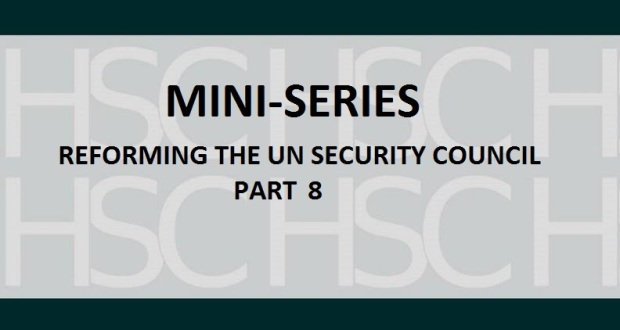July 3rd, 2015
By Michelle McKenna – Senior Fellow
The 70th Anniversary of the United Nations offers the perfect opportunity to reflect on its successes and failures. Undoubtedly the world is far more secure today through the existence of the UN; however conflicts and human rights abuses still occur on a regular basis and often the UN is incapable of doing anything to stop this. This is primarily as a result of inaction of the Security Council, frozen by the power of the veto placed in the hands of a few. By a few simple reforms, the UN can reach the “Strong UN. Better World.” goal it is trying to achieve.
The Human Security Centre is in favour of reforming the Security Council. The Council as it operates at the moment is broken and nothing demonstrates this more clearly than the continued inaction in Syria. As one journalist has stated, the Security Council is currently like Albert Einstein’s definition of insanity: “doing the same thing over and over again in the expectation of a different result each time.”[1] This is certainly true of the UN Security Council – without reform, it will continue to be plagued with the same problems and thousands around the world will suffer. But any reforms that go ahead have to be done correctly to ensure that the Council in reality does become more effective and isn’t just perceived to be.
The number of seats on the Security Council has to increase to ensure that the Council is representative and reflects the growing size of the UN as a whole. Increased regional representation for Africa, Asia and Latin America in particular is favoured, including permanent seats for these regions. Any enlargement, however, should be modest to ensure that decision-making does not become overly cumbersome.
In an ideal world the permanent members would not have a veto that can block intervention on political grounds; however, states such as the US and Russia are major players in international affairs and they deserve a permanent seat on the Council accordingly. The permanent members need to work together to restrict their use of the veto, with pressure on them not to veto when there is risk of grave human rights abuses, genocide, ethnic cleansing, crimes against humanity and war crimes. It would be unwise to affirm the use of the veto power by extending it to new permanent members; however, enough of a hierarchy already exists within the Council without enhancing this even further.
The Council should increase its cooperation with regional agencies in addition to these reforms. This will help to make the Council more legitimate as the African Union, for example, can better serve the needs of Africa than the Security Council can and the Council should take advantage of this. The African Union plays an increasingly important role for the UN in peacekeeping and conflict resolution and this needs to be reflected in its relationship with the Security Council, including a permanent seat on it. The working methods of the Council in decision-making also have to be greatly reformed in order to ensure that the Council remains effective. The Council should more regularly consult with interested parties, including NGOs, and take account of public opinion and not use the veto to block action arbitrarily. The HSC supports the idea of the Council relying on its own jurisprudence, as it will ensure that it is able to take action in the face of atrocities, but this should not be binding on the Council as it could create a dangerous precedent.
Reform of the Security Council has already been a long, drawn out process and there is no indication that this is going to change anytime soon. However, in this 70th Anniversary year of the UN, the time has never been riper to achieve reform. As Secretary General Ban Ki-moon stated earlier this year, “2015 is not just another year, it is a chance to change the course of history…”[2] It is important that when negotiating changes, states work together to ensure that the Council becomes more legitimate and credible through increasing its accountability and transparency. Only then can the Council become the effective body the world needs it to be.
Julie Lenarz, the HSC’s Executive Director, said: “The UN exists of a large proportion of undemocratic, even totalitarian, members which do not derive their legitimacy from their people’s mandate. Many of these states do not acknowledge the founding principles of the UN, some having appalling human rights legacies and some have committed genocide and mass murder. Russia and China are permanent members of the UNSC, yet have been guilty of a whole swath of violations of the institution’s ideals. It is unrealistic to expect such countries to properly reign over the protection of human rights in the world. Humanitarian idealism cannot reside in an institution which is incapable of separating national interest from commitments to a progressive set of ideals. A fundamental transformation needs to take place in which the UNSC is institutionally reappraised and its duties, authority and jurisdiction re-examined.”
This concludes the Human Security Centre’s mini-series on reform of the United Nations Security Council.
[1] Ramesh Thakur, How to achieve UNSC reform, Japan Times 8th June 2015 http://www.japantimes.co.jp/opinion/2015/06/08/commentary/japan-commentary/how-to-achieve-unsc-reform/#.VX2psdyGsds
[2] Secretary-General Ban Ki-moon’s remarks to the UN Youth Forum, 2nd Feb 2015 http://www.un.org/un70/en
 Human Security Centre Human Rights and International Security Research
Human Security Centre Human Rights and International Security Research




